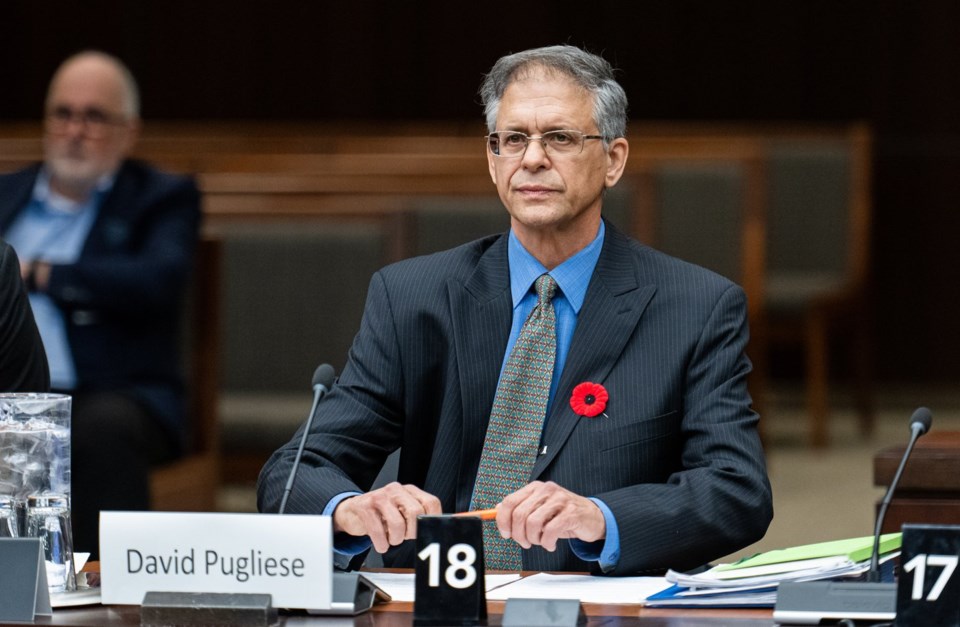OTTAWA — A veteran Ottawa Citizen journalist who was accused by a former cabinet minister of being a Russian asset said it is the "height of irony" that a parliamentary committee studying disinformation has fallen for it.
David Pugliese told the House of Commons security committee on Thursday he found it astonishing that none of the MPs challenged the allegations when they were made last month.
Chris Alexander, a former Conservative cabinet minister and ambassador to Afghanistan, made the allegations at an Oct. 24 meeting.
Alexander presented the committee with what he said were KGB documents dated 1984 through 1990, which apparently say the Soviet spy agency saw Pugliese as a potential asset.
In a previous interview with The Canadian Press, Pugliese said the documents given to the committee are the same ones involved in an ongoing civil lawsuit over reporting he did about allegedly faulty equipment sent to Ukraine.
Alexander told the committee the documents are evidence of "a serious effort to undermine Canada's national security and collective self-defence."
The former MP told The Canadian Press last month he stands by what he said to the committee.
Pugliese said Thursday he was testifying to correct the record and defend himself from a "character assassination" carried out under parliamentary privilege.
"Astonishingly, not one MP on the committee raised a single critical question about these explosive allegations involving a veteran Canadian journalist with a 40-year track record," Pugliese said.
"It is the height of irony that a committee studying disinformation would in fact propagate it."
In a statement after the Oct. 24 meeting, he said he was disappointed to see NDP MP Peter Julian and Conservative MP James Bezan "aid" in the attack on his character through their questions to Alexander.
Neither MP was present during Pugliese's testimony, and they are not regular members of the committee.
MPs from all parties said Thursday they were caught off guard by the accusations, saying they did not have proper time to review the documents before the meeting.
NDP MP Alistair MacGregor, who was not at the Oct. 24 meeting, said his office received the documents about three hours before that meeting began.
The translated versions of the documents name Pugliese and refer to him by the code name "Stuart," and state that an agent known as "Ivan" was tasked with building a relationship with him.
Pugliese said he did not live in Ottawa in 1984 nor 1988, as stated in the documents. He said it is accurate that he was working for the Ottawa Citizen in 1989 and 1990.
Before that, Pugliese said he wrote for a Canadian Armed Forces journal.
"Would you say those are hotbeds for communists, those Canadian Armed Forces journals?" Conservative MP Dane Lloyd asked.
"No, my work in the 1980s would not be described as an op-ed for communists," Pugliese replied.
Since the Oct. 24 meeting, the journalist said he has received death threats and his family has been told they should be deported. Pugliese said he's had to increase his home security in the aftermath.
Brent Jolly, president of the Canadian Association of Journalists, appeared alongside Pugliese to talk about the impact of disinformation.
When asked what kind of tools Canadians should have to better parse fact from fiction, Jolly said critical thinking and media literacy are essential.
"People are on their smartphones right now. You are engaging in an environment where there is warfare going on right now, and you need to be able to have the tools to fight back against that," Jolly said.
"If you come with twigs and figs or something, you're going to lose. And you're going to see misinformation and disinformation campaigns."
When asked how to increase media literacy, Jolly suggested classes should be added to school curriculums, comparing its importance in the modern landscape to understanding math and biology.
This report by The Canadian Press was first published Nov. 7, 2024.
— With files from Rosa Saba
David Baxter, The Canadian Press



